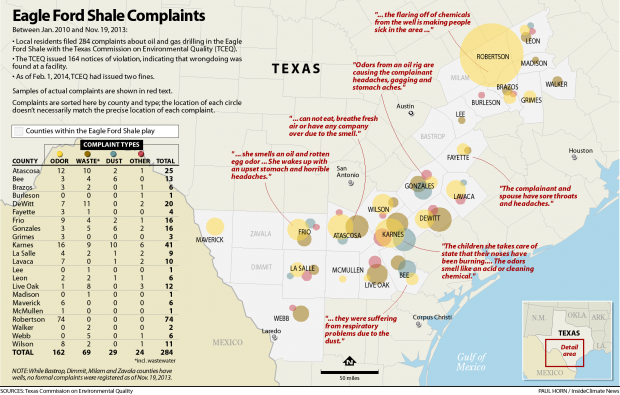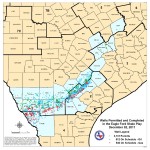Watch: Fracking The Eagle Ford Shale – Big Oil And Bad Air On The Texas Prairie
Fracking The Eagle Ford Shale: Big Oil And Bad Air On The Texas Prairie from Weather Films on Vimeo.
A new joint investigation out this week on air quality in the Eagle Ford Shale has brought up troubling questions about the effect fracking in South Texas is having on the health of residents. Inside Climate News, The Center for Public Integrity, and the Weather Channel cooperated on the report, which took eight months.
Among the report’s findings:
- “Texas’ air monitoring system is so flawed that the state knows almost nothing about the extent of the pollution in the Eagle Ford. Only five permanent air monitors are installed in the 20,000-square-mile region, and all are at the fringes of the shale play, far from the heavy drilling areas where emissions are highest.”
- “Thousands of oil and gas facilities, including six of the nine production sites near the Buehrings’ house, are allowed to self-audit their emissions without reporting them to the state. The Texas Commission on Environmental Quality (TCEQ), which regulates most air emissions, doesn’t even know some of these facilities exist. An internal agency document acknowledges that the rule allowing this practice “[c]annot be proven to be protective.”
- “Companies that break the law are rarely fined. Of the 284 oil and gas industry-related complaints filed with the TCEQ by Eagle Ford residents between Jan. 1, 2010, and Nov. 19, 2013, only two resulted in fines despite 164 documented violations. The largest was just $14,250. (Pending enforcement actions could lead to six more fines).”
The report also notes that the TCEQ’s budget has been slashed, reducing their ability to conduct inspections and air monitoring. Simultaneously, there has been a “100 percent statewide increase in unplanned, toxic air releases associated with oil and gas production since 2009.” These “are usually caused by human error or faulty equipment,” the report notes, and can be fixed.
The oil and gas industry wasted no time in issuing a response dismissing the investigation through the industry-funded Energy In Depth, saying it is “based on phony science a deliberate misreading of the regulatory regime.”
Also of note are the roadblocks the team faced from state regulators and the oil and gas industry itself. While these obstacles are familiar to anyone who’s ever reported on the fracking boom in Texas, they raise questions about what the state and industry are trying to hide:
- “The agency responsible for regulating air emissions—the TCEQ—refused to make any of its commissioners, officials or investigators available for interviews. Instead, we had to submit questions via emails that were routed through agency spokespeople. It’s unclear if the spokespeople passed our questions along to the agency’s experts. We received answers to most of our emails, often in some detail. But some of our questions were ignored or answered with talking points on general topics. The TCEQ employees who dealt with our public records requests were helpful and responsive, however. They discussed the filing process over the phone and answered questions about our requests.”
- “When a reporter called TCEQ field inspectors at their homes—a commonly used reporting technique—TCEQ spokeswoman Andrea Morrow left the reporter a message saying, “Under no circumstances are you to call our people and harass them at home.” Morrow also blocked the reporter from approaching the agency’s chairman, Bryan Shaw, at a public meeting in Austin.”
- “The agency’s public records pricing system was puzzling. We were charged as little as 20 cents for one document but were asked for more than $10,000 to provide a batch of documents that had been given to another news agency years ago. We withdrew our request.”
- “The Texas Railroad Commission, which regulates drilling and all other aspects of the industry, made Commissioner David Porter available for a 10-minute phone interview. The Weather Channel later scheduled an on-camera interview with Porter, but when the producers arrived at the appointed time, they were told Porter was sick and would not be available for the next month. Like the TCEQ, the Railroad Commission spokespeople refused to discuss anything on the phone, including even technical questions about the mapping data we purchased from the agency. Nor would they make Porter or other top officials available for final, pre-publication phone interviews.”
- “Industry officials in Texas were as reluctant as regulators to meet face-to-face or go on camera. Most insisted that all queries be submitted in writing. No tours of Eagle Ford operations were allowed, despite several requests. No on-the-ground discussions of air pollution were facilitated. Hunt Oil was the exception. When we asked about a problem at one of its processing plants, the company set up a phone interview with an executive who answered our questions.”


